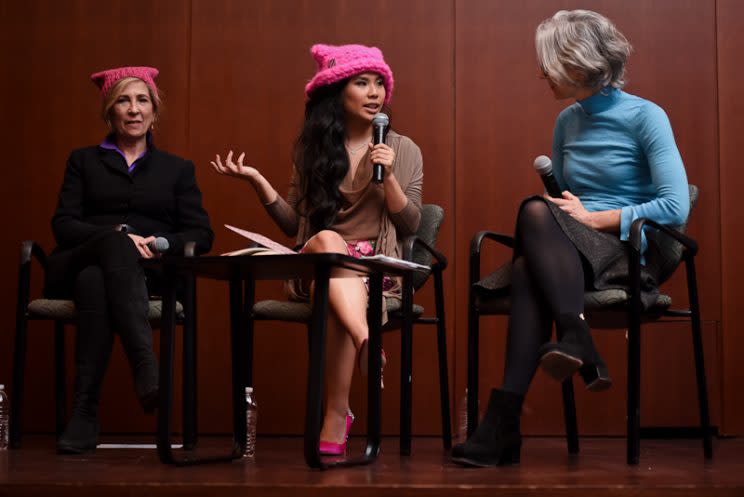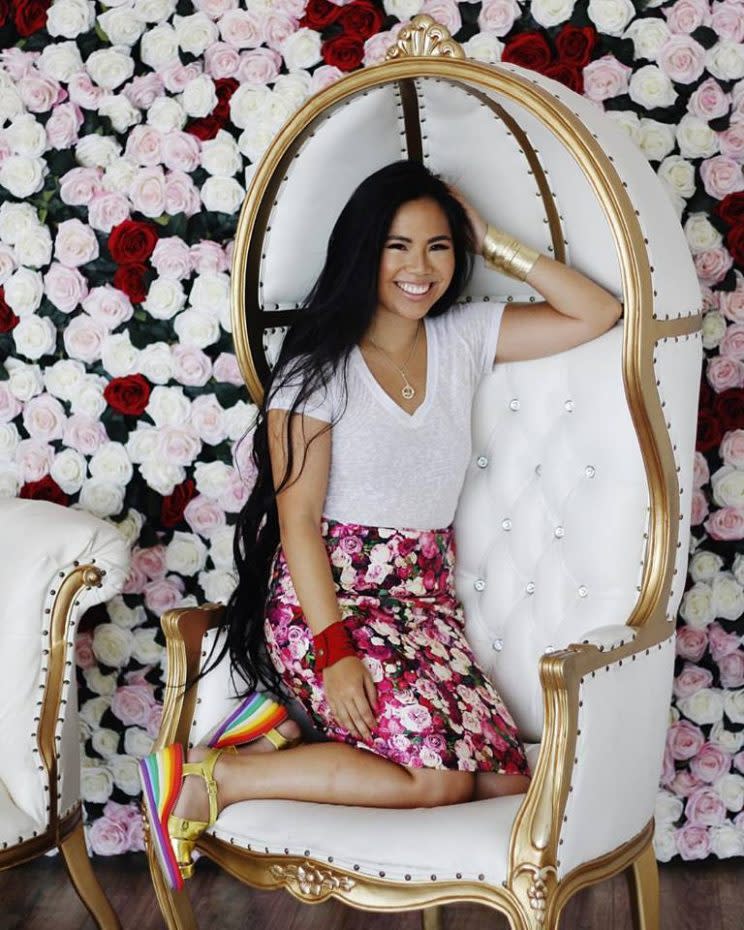Pussyhat Project Founder Has Powerful Answer for Transgender Critics
If there is one enduring image from the Jan. 21 Women’s March on Washington, it’s certainly this: a sea of pink, thanks to all the aerial photos of protesters in their hand-knit pussyhats. They were devotees of the Pussyhat Project, founded by Krista Suh and Jayna Zweiman in late November as a way to grab back the word “pussy” and take back ownership of the conversation around women’s rights — and to exude power and playfulness all at once.
It took off like wildfire and spread around the world, with pink yarn selling out and more than 100,000 hats made for distribution across the country, but naysayers began to emerge immediately after the march — and they weren’t Trump supporters. Instead, they were women who said they felt dissed by the symbol — named, albeit playfully, for an anatomical part — because they were transgender. Critics called it “vagina-centric,” “genitalia-based feminism,” and on Feb. 15, while speaking at her alma mater, Barnard College, Suh responded.

“The word ‘pussy’ is used to call anyone weak … and is actually a slur against not being female, but being feminine,” Suh told the crowd of mostly women, many wearing pussyhats, in response to an audience member who raised the issue of her transgender friends feeling “excluded” by the “aggressive gendering” of the symbol.
“In this world, we still define gender by these biological parts,” Suh continued. “And I think before we get to the point where we no longer do that, and more into gender-fluid, we have to respect feminine more, because right now it’s not. It doesn’t matter if it’s femininity in a woman or a man or a gender-queer person or a trans person — it’s attacked physically, emotionally, verbally. So I think … ‘pussy’ isn’t literally about the vulva or the vagina and all that, it’s also about making femininity as valid as masculinity.”
She added, “I think just because it has a gendered name doesn’t mean we believe that being a woman is predicated on having a pussy. That is not what we say and not what we believe. … We don’t want a vulnerable community to feel excluded.”

Suh, a 2009 Barnard graduate who is now a Los Angeles-based screenwriter, was joined by several others for a panel discussion of the project: knitting-world leaders Brittney Bailey and Pearl Chin, owners of New York City stores Purl Soho and Knitty City, respectively; Joan Snitzer, a Barnard art history lecturer; and moderator Anne Higonnet, an art history professor at Barnard.
But first Suh addressed the beginnings of the project, and having to overcome her now-waning instinct to “squelch” rather than “nurture” her creative ideas. She encouraged all other women to follow their own creative instincts, and noted, “I didn’t create the Pussyhat Project because I followed the rules and I tried hard. No — the reality is, I followed my intuition.”
The concept hit her shortly after the election, on Nov. 12, while her mind was wandering during a family road trip. “I wanted to do something more for the march, if I could,” she said, recalling how she aimed for a visual message, and preferably one that could help keep her and others warm. She thought of knitting, a skill her grandmother had taught her, and then of hats. “I could see the sea of pink,” Suh said (a color chosen, the manifesto explains, because it represents “caring, compassion, and love — all qualities that have been derided as weak but are actually STRONG”). “I could see people participating, even if they weren’t physically there.”
After getting knitting-world star Kat Coyle onboard to design the pattern and artist Aurora Lady to bring Suh’s vision of the instructional pamphlet to life, women began clamoring to be part of it all. Suh said she and Zweiman stayed focused on the power in the project, as well as the obvious humor of the symbol. “To be able to laugh shows we haven’t succumbed,” she noted. As for the power, she said she has endless stories of knitting as resistance.
“We got a hat,” she said, as part of the effort to have women knit them for those who were going to the march and could not knit their own. “There was no return address on it. And she wrote, ‘I’m sorry, I made this hat for the Women’s March in secret, and I had to bring it to the post office in secret, because I’m afraid my husband will find out.’ So it’s not just women in far-flung countries, it’s women here that we have to speak up for.”
And that, as they say, is herstory — one that museums have been clamoring to collect, with six so far reaching out to Suh, including her “favorite,” the Victoria & Albert Museum in London. Still, when an audience member on Wednesday asked with some concern about whether someone has been documenting the hat movement on film, Suh said no, adding, “It’s gotten so big, I don’t need to collect everything. It’s a part of us now.”
Related: Pink Pussyhats Unite Millions at Women’s Marches Around the World
Related: Barack Is Out of Office But Still In Style
Let’s keep in touch. Follow Yahoo Style on Instagram, Facebook, and Pinterest for inspiration delivered fresh to your feed, every day.

